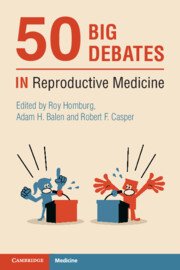Book contents
- 50 Big Debates in Reproductive Medicine
- Series page
- 50 Big Debates in Reproductive Medicine
- Copyright page
- Contents
- Contributors
- Foreword
- Introduction
- Section I Limits for IVF
- Section II IVF Add-ons
- Section III The Best Policy
- 14A IVF Should Be First-Line Treatment for Unexplained Infertility of Two Years Duration
- 14B IVF Should Be First-Line Treatment for Unexplained Infertility of Two Years Duration
- 15A Single Embryo Transfer Should Be Performed in All IVF Cycles
- 15B Single-Embryo Transfer Should Be Performed in All IVF Cycles
- 16A The Freezing of All Embryos Should Be Used for All IVF Cycles
- 16B The Freezing of All Embryos Should Be Used for All IVF Cycles
- 17A Luteal-Phase Support Should Be Stopped at the Time of a Positive Pregnancy Test
- 17B Luteal Phase Support Should Be Stopped at the Time of a Positive Pregnancy Test
- 18A A Natural Cycle Is the Best Protocol for Frozen Embryo Replacement
- 18B A Natural Cycle Is the Best Protocol for Frozen Embryo Replacement
- 19A All Pregnancies Conceived by IVF Should Be Delivered by Caesarean Section
- 19B All Pregnancies Conceived by IVF Should Be Delivered by Caesarean Section
- 20A Endometriosis Should Be Suppressed for 6–12 Weeks before Frozen Embryo Transfer
- 20B Endometriosis Should Be Suppressed for 6–12 Weeks before Frozen Embryo Transfer
- 21A Infertile Patients with Endometriosis Benefit from Surgery
- 21B Infertile Patients with Endometriosis Benefit from Surgery
- 22A Intramural Fibroids Greater than 4 cm in Diameter Should Be Removed to Aid Fertility
- 22B Intramural Fibroids Greater than 4 cm in Diameter Should Be Removed to Aid Fertility
- 23A All Infertile Women with a Uterine Septum Should Have a Surgical Removal
- 23B All Infertile Women with a Uterine Septum Should Have a Surgical Removal
- Section IV Embryology
- Section V Ethics and Statistics
- Section VI Male-factor Infertility
- Section VII Genetics
- Section VIII Ovarian Stimulation
- Section IX Hormones and the Environment
- Index
- References
17B - Luteal Phase Support Should Be Stopped at the Time of a Positive Pregnancy Test
Against
from Section III - The Best Policy
Published online by Cambridge University Press: 25 November 2021
- 50 Big Debates in Reproductive Medicine
- Series page
- 50 Big Debates in Reproductive Medicine
- Copyright page
- Contents
- Contributors
- Foreword
- Introduction
- Section I Limits for IVF
- Section II IVF Add-ons
- Section III The Best Policy
- 14A IVF Should Be First-Line Treatment for Unexplained Infertility of Two Years Duration
- 14B IVF Should Be First-Line Treatment for Unexplained Infertility of Two Years Duration
- 15A Single Embryo Transfer Should Be Performed in All IVF Cycles
- 15B Single-Embryo Transfer Should Be Performed in All IVF Cycles
- 16A The Freezing of All Embryos Should Be Used for All IVF Cycles
- 16B The Freezing of All Embryos Should Be Used for All IVF Cycles
- 17A Luteal-Phase Support Should Be Stopped at the Time of a Positive Pregnancy Test
- 17B Luteal Phase Support Should Be Stopped at the Time of a Positive Pregnancy Test
- 18A A Natural Cycle Is the Best Protocol for Frozen Embryo Replacement
- 18B A Natural Cycle Is the Best Protocol for Frozen Embryo Replacement
- 19A All Pregnancies Conceived by IVF Should Be Delivered by Caesarean Section
- 19B All Pregnancies Conceived by IVF Should Be Delivered by Caesarean Section
- 20A Endometriosis Should Be Suppressed for 6–12 Weeks before Frozen Embryo Transfer
- 20B Endometriosis Should Be Suppressed for 6–12 Weeks before Frozen Embryo Transfer
- 21A Infertile Patients with Endometriosis Benefit from Surgery
- 21B Infertile Patients with Endometriosis Benefit from Surgery
- 22A Intramural Fibroids Greater than 4 cm in Diameter Should Be Removed to Aid Fertility
- 22B Intramural Fibroids Greater than 4 cm in Diameter Should Be Removed to Aid Fertility
- 23A All Infertile Women with a Uterine Septum Should Have a Surgical Removal
- 23B All Infertile Women with a Uterine Septum Should Have a Surgical Removal
- Section IV Embryology
- Section V Ethics and Statistics
- Section VI Male-factor Infertility
- Section VII Genetics
- Section VIII Ovarian Stimulation
- Section IX Hormones and the Environment
- Index
- References
Summary
The pivotal role of luteal phase support (LPS) in establishing and maintaining IVF pregnancies has been one of the earliest subjects to become evidence-based in clinical ART. Following controlled ovarian stimulation (COS) and ovulation triggering by hCG, pulsatile pituitary LH secretion has been demonstrated to be severely compromised and unable to support normal function of the corpora lutea, resulting in a deficient luteal phase that must be pharmaceutically supported. This was initially demonstrated for GnRH agonist protocols and subsequently confirmed for GnRH antagonist cycles as well. After implantation, embryonic hCG takes over pituitary LH in supporting the corpus luteum (CL) and maintains its function until the establishment of the luteo-placental shift, at around the 8th gestational week. It has been clearly demonstrated that LPS is crucial in filling the gap between the disappearance of exogenously administered hCG for ovulation triggering and the initiation of secretion of endogenous hCG from the implanting conceptus. Early studies have estimated that exogenously administered hCG remains in the circulation for up to 7 days, and that the CL has a remarkable ability to recover after a week of deprivation from gonadotropin stimulation (1).
- Type
- Chapter
- Information
- 50 Big Debates in Reproductive Medicine , pp. 93 - 95Publisher: Cambridge University PressPrint publication year: 2021



